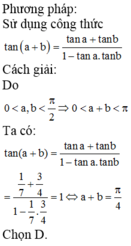Cho hai góc nhọn a và b thỏa mãn t a n a = 1 7 và tan b = 3 4 . Tính a + b
A. π 3
B. 2 π 3
C. π 6
D. π 4
Hãy nhập câu hỏi của bạn vào đây, nếu là tài khoản VIP, bạn sẽ được ưu tiên trả lời.



Chọn B.
Theo công thức cộng ta có:

Mà a và b là các góc nhọn suy ra 

Chọn D.
Áp dụng công thức biến đổi tích thành tổng và công thức nhân đôi ta có:
cos( a + b) cos (a - b)= ½ . ( cos 2a + cos2b)
= cos2a + cos2b - 1 = 

Đáp án B
Phương pháp giải:
Dựa vào đồ thị hàm số xác định hoành độ điểm D suy ra tung độ điểm A chính là độ dài BC
Lời giải: Gọi ![]() với
với ![]()
Gọi ![]() thuộc đồ thị
thuộc đồ thị ![]()
Vì ABCDlà hình chữ nhật ![]()
Khi đó BC = m. Mà ![]()


a: pi/2<a<pi
=>sin a>0
\(sina=\sqrt{1-\left(-\dfrac{1}{\sqrt{3}}\right)^2}=\dfrac{\sqrt{2}}{\sqrt{3}}\)
\(sin\left(a+\dfrac{pi}{6}\right)=sina\cdot cos\left(\dfrac{pi}{6}\right)+sin\left(\dfrac{pi}{6}\right)\cdot cosa\)
\(=\dfrac{\sqrt{3}}{2}\cdot\dfrac{\sqrt{2}}{\sqrt{3}}+\dfrac{1}{2}\cdot-\dfrac{1}{\sqrt{3}}=\dfrac{\sqrt{6}-2}{2\sqrt{3}}\)
b: \(cos\left(a+\dfrac{pi}{6}\right)=cosa\cdot cos\left(\dfrac{pi}{6}\right)-sina\cdot sin\left(\dfrac{pi}{6}\right)\)
\(=\dfrac{-1}{\sqrt{3}}\cdot\dfrac{\sqrt{3}}{2}-\dfrac{\sqrt{2}}{\sqrt{3}}\cdot\dfrac{1}{2}=\dfrac{-\sqrt{3}-\sqrt{2}}{2\sqrt{3}}\)
c: \(sin\left(a-\dfrac{pi}{3}\right)\)
\(=sina\cdot cos\left(\dfrac{pi}{3}\right)-cosa\cdot sin\left(\dfrac{pi}{3}\right)\)
\(=\dfrac{\sqrt{2}}{\sqrt{3}}\cdot\dfrac{1}{2}+\dfrac{1}{\sqrt{3}}\cdot\dfrac{\sqrt{3}}{2}=\dfrac{\sqrt{2}+\sqrt{3}}{2\sqrt{3}}\)
d: \(cos\left(a-\dfrac{pi}{6}\right)\)
\(=cosa\cdot cos\left(\dfrac{pi}{6}\right)+sina\cdot sin\left(\dfrac{pi}{6}\right)\)
\(=\dfrac{-1}{\sqrt{3}}\cdot\dfrac{\sqrt{3}}{2}+\dfrac{\sqrt{2}}{\sqrt{3}}\cdot\dfrac{1}{2}=\dfrac{-\sqrt{3}+\sqrt{2}}{2\sqrt{3}}\)

Vì π < a < 3 π 2 nên sina < 0; cosa < 0. Ta có
sin α - 2 cos α = 1 sin 2 α + cos 2 α = 1 ⇒ 1 + 2 cos α 2 + cos 2 α = 1 ⇒ 5 cos 2 α + 4 cos α = 0 ⇒ cos α = - 4 5
Suy ra α = - 1 - cos 2 α = - 3 5 ; tan α = 3 4 ; c o t α = 4 3 . Vậy A = 2tana - cota = 2 . 3 4 - 4 3 = 1 6
Đáp án B

a) Có:
\(a+b+c=0\\\Leftrightarrow\left(a+b+c\right)^2=0\\ \Leftrightarrow a^2+b^2+c^2+2ab+2bc+2ca=0\\ \Leftrightarrow2ab+2bc+2ca=-1\\ \Leftrightarrow ab+bc+ca=-\dfrac{1}{2}\\ \Leftrightarrow\left(ab+bc+ca\right)^2=\left(-\dfrac{1}{2}\right)^2=\dfrac{1}{4}\\ \Leftrightarrow a^2b^2+b^2c^2+c^2a^2+2a^2bc+2ab^2c+2abc^2=\dfrac{1}{4}\\ \Leftrightarrow a^2b^2+b^2c^2+c^2a^2+2abc\left(a+b+c\right)=\dfrac{1}{4}\\ \Leftrightarrow a^2b^2+b^2c^2+c^2a^2=\dfrac{1}{4}-0=\dfrac{1}{4} \)